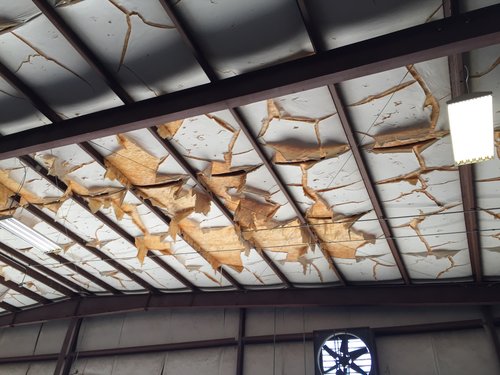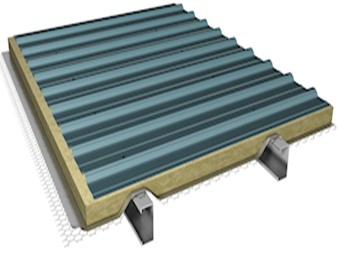Roof Insulation
Expert Roof Insulation Services in Dubai for Energy Efficiency & Comfort
It is common with most roofs made of metal since it is long lasting; it has a uniquely high rating in relation to its durability and strength well fitting the extreme weather resistance capability. Nevertheless, this roofing material like any other roofing material is prone to some wear out at certain times. In order to keep a metal roof continuous to offer its optimum performance, it is important that it is subjected to routine check up and other repair work when necessary.
Here’s why metal roof repair is essential
1. Stop Leakage and Water Infiltration
One of the biggest concerns that ought to compel an individual or a property owner to consider repairing a metal roof is water leakage.
Eventually the metal panels may get dislodged, screws may corrode or wooden or rubber gaskets may degrade, causing water to enter.
This is because even a small leakage ends up causing a lot of damages especially inside the building through the growth of mold, rotting of timber and other structural problems.
In this respect, it possible to prevent small problems from developing into major ones that require massive repairs.
2. Extending the Roof’s Lifespan
In essence, metal roofs are LONGEVITY but annual maintenance and repair will help elongate the life of your metal roof. By conducting ad-hoc check and inspections, it is possible to prevent some of the problems such as corrosion, faulty fastening screws, and worn seals, which reduces the working life of the roof. In caring for your roof you make sure that you continue to get your shelter for a longer period.
3. Energy Efficiency
Metal roofs are popular because of their energy efficiency as the material is known to having properties that reflects heat. Nevertheless, if the roof of the building is damaged or decays it is a problem that will significantly reduce its ability to function as an insulating mechanism on energy.
Damaged spacers, worn-out seals, and gaps within the double glasses can let in heat in the winter and deny it in the summer resulting to expensive bills. These problems have to be addressed because, apart from preserving the stability of the roof’s structure, they keep energy expenditures in check.

4. Preventing Structural Damage
Damaged metal roof also impacts on the overall structural support of your building structure or home.
Sometimes water gets in, rust or corrosion may occur and the material that the roof is supposed to support such as wood or insulations may weaken and cause sagging roofs or even weakened support beams.
This is especially true when one considers the issue of safety whereby early damage to the metal roof may lead to development of major structural issues that make the building unsafe.
5. Maintaining Aesthetic Appeal
One of the biggest advantages of having metal roofs is that they give your building an aesthetic touch making it more glamorous. Nonetheless, any spot that may be observed to have rust, dent or has paint that has faded from its original color will lower the appearances’ look.
Apart from ensuring the roof functions as it is expected, maintenance and repairs ensure aesthetic value especially for commercial buildings or homes that are within residential areas.
6. Protecting Against Severe Weather
Metal roof decks are known to be very resistant to these weather conditions such as rain, wind or even hail storms. However, with time, the mentioned elements have a tendency of affecting the surface, seals as well as the fasteners on the roof.
This helps to maintain the durability of the roof and to maintain the general look during harsh weather conditions so as to avoid leakages.
7. Cost Savings
But in terms of cost, it is much costly to repair a metal roof, if not repaired it may lead to more serious problems which need more money for repair. Routinely inspections and quick fix jobs are actually a more cost effective solution, and reduce the likelihood of major repair work or even the necessity for roof replacement.



What is the the main causes of leaks in roofing systems?
The main causes of leaks in roofing systems are usually due to vulnerable areas like joints and overlaps in roof panels. Proactive measures are necessary to prevent water infiltration and protect the roof’s integrity.
Key Points:
- Vulnerable Areas: Joints and overlaps of roof panels are prone to water infiltration, especially under changing weather conditions.
UV-Resistant EPDM Rubber Strips
- Designed specifically for roofing applications.
- Resist UV rays, maintaining durability and preventing degradation.
- Typically measure 100mm in width.
Special Adhesives for Bonding:
- UV-resistant adhesives are essential for creating a secure, watertight seal over joints and overlaps.
- Helps prevent water seepage and structural damage.
Tightening Loose Screws:
- Loose screws can allow water to enter the roof structure.
- Should be replaced with larger stainless steel screws with EPDM washers for enhanced waterproofing.
Additional Sealing Over Screw Heads:
- Apply UV-resistant rubbers over screw heads for extra protection against moisture ingress.
Why Choose Us for Waterproofing in the UAE?
- 25 Years of Experience: We have been a trusted name in waterproofing solutions in the UAE for over two decades.
- Expert Inspection Team: Our skilled professionals conduct thorough inspections to identify problem areas and provide the most effective solutions.
- Guaranteed Work: We stand behind our services, offering guarantees to ensure long-term protection and customer satisfaction.
- Customized Solutions: Tailored waterproofing strategies to suit the specific needs of each project, whether residential, commercial, or industrial.
- High-Quality Materials: We use advanced, durable materials designed to withstand the UAE’s extreme weather conditions.
We Always Work With
Energetic Team
JOHN T. WILSON
With over 45 years as an accomplished Senior Executive and Advisor across the construction, manufacturing, mining, solar energy, oil & gas, retail, storage, logistics, transportation and defense industries. This background has given him extensive knowledge of the application of systems procedures in the industrial, bridge, commercial, health care, aviation, military, high-rise buildings, solar & Self Storage Industries. This has led him to have a strong understanding of American and International business culture alongwith working in sales, marketing, business development, procurement, design and construction management. His ability to cultivate opportunities with new and existing clients with a strong belief in teamwork to provide responsive customer service as the best way to continue and develop relationships with people they can trust to look after their best interest. Previous customers and employees have followed him to work with PEB as they want to continue a relationship with a person that they respect who honors their commitments.
High educational back ground with Masters Degree in Finance from Oklahoma State University, Oklahoma USA and BE Mechanical Engineering from University of Engineering & Technology, Lahore, Pakistan. Held coveted positions of VP in large and diversified conglomerate Mammut Group, UAE. Held numerous elected positions in the society such as Senator at Oklahoma State University and School Captain. Avid Golfer, Squash Player and Cricketer. Now an Entrepreneur with 3 Companies in Diversified Fields like Waterproofing, LED Lighting and Pre-Engineered Buildings as well as having more than 30+ years of working and Management Experience
FAQS
You can find answers to all your key questions about our services.
Pebtech offers various roof insulation services, including thermal insulation, waterproofing, and soundproofing solutions tailored to different building types and climates in the UAE.
Roof insulation is crucial in the UAE due to extreme temperatures. It helps reduce energy consumption, improves indoor comfort, and protects the roof structure from damage caused by heat and UV exposure.
The installation time depends on the size of the roof and the type of insulation. On average, it takes 1-3 days for a residential roof and slightly longer for commercial buildings.
Pebtech uses high-quality insulation materials such as polyurethane foam, extruded polystyrene (XPS), fiberglass, and reflective coatings, ensuring long-lasting and energy-efficient results.
Yes, roof insulation can significantly lower electricity bills by improving energy efficiency, reducing the need for excessive air conditioning in the hot UAE climate.
Pebtech provides waterproofing services along with insulation to protect roofs from leaks and water damage, ensuring that the roof remains durable and leak-free during heavy rains.
Yes, Pebtech offers regular maintenance services to ensure the insulation remains effective and the roof is protected from potential damage or deterioration.
Roof insulation helps regulate indoor temperatures, reducing the strain on HVAC systems. This leads to better air circulation and reduced humidity levels, improving overall air quality.
Yes, Pebtech uses environmentally friendly insulation materials that help reduce energy consumption, contributing to a lower carbon footprint and sustainable living.
You can contact Pebtech via their website or phone to request a free consultation and quote for your roof insulation needs. A team member will assess your requirements and provide a customized solution.


